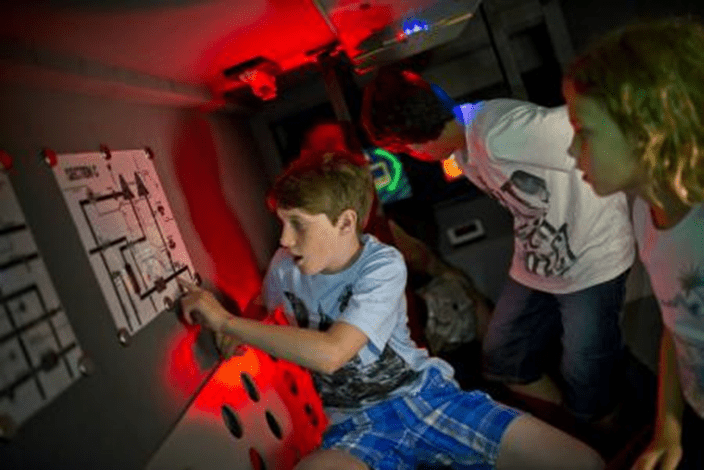Escape Room Games require solving puzzles and figuring out clues to accomplish the goal. So, it would not be a stretch to say that escape room games enhance practical life skills among both kids and adults. Now, when we talk about how escape room games help in developing practical life skills, we must explain what escape room games are.
What exactly are escape room games?
Escape room games came into existence after the popularity of live-action role-playing games (LARP) and treasure hunts. They were also inspired by locked-room mystery-solving and mission-oriented video games. Escape room games are recreational games where players (individually or as a team) are voluntarily locked inside a room. The “locked” aspect is mostly theoretical, as in, they are not really locked in a room. By using a particular scenario and setting up a challenge, escape room games create a competitive edge for the people. It demands complete concentration from the player in order to solve a riddle. The players must solve different riddles to unlock the doors or to get hidden clues. All these tasks must be completed within a given time period.
The whole game is navigated by the game master. It is the game master who is in charge of introducing the scene and helping out as required. The most important part of an escape room game is the deductive skill of the person. So, it is required that the players must use their brains to figure things out easily. It doesn’t matter if they are a child or an adult, they must use logic and reasoning.

Escape room games: Recreational and Educational
Most escape room games are meant to be recreational, but nowadays, there is a high demand for educational escape rooms. This is because these escape room games promote social and practical life skills. According to Nicholas Dietrich, the author of “Escape classroom;
His study shows that the inclusion of escape room games for educational purposes has been helpful in involving the students in the learning process. It is exactly this unique sort of learning environment that popularised escape room games for kids. Escape room games are a real-life application of all the cognitive and social skills the kids were supposed to learn. Escape room games make the students go through mental exercises to solve the puzzle. Escape room games not only motivate the kids but also possess a myriad of advantages in enhancing their practical life skills. The inclusion of both physical and virtual; escape room games has forced players to sharpen their knives as well.

5 ways in which escape room games enhance the practical life skills of Kids
Let us explore the ways in which escape room games enhance the practical life skills of kids:
1. Cognitive ability
First and foremost, we need great critical thinking and logical reasoning to crack the game. The scenarios are usually easy to understand, but they require a lot of brainpower to figure out the hidden meanings or clues. The games are not meant to be easy but rather a test of your cognitive abilities. Anything you see, hear, or smell will have some kind of meaning.
To figure out precisely what you must do to crack the puzzle, you need to be able to think properly. The kids will be trained in a way to decipher different patterns. Sometimes they may even come across red herrings. This is why they must look closely and try to determine their purpose.
You cannot think (pun intended) of critical thinking and logical reasoning, i.e., cognitive ability, without considering them as the most important practical life skill.
2. Memory exercise
Escape room games are a great source of mental exercise, as we learned. The games demand precise deduction and great memory. During the game, you will need to remember the clues very well. You must also take note of anything that is out of place or looks different. You will require a piece of good general knowledge to crack the code. Understanding the mysterious patterns will also lead to victory.
It is through this that the kids will learn how to recall their own memory and use their knowledge to their advantage. In the course of life, this will be very helpful to them.
3. Time management
Time management is one of the most important practical life skills that kids should learn. Even as adults, we struggle to manage all of our tasks under a fixed time limit. It is crucial for the children to learn how to manage their time as soon as they can. This will increase their productivity and lead them to a healthier life.
As escape room games require players to complete the missions under a given time limit, it automatically increases their ability to function under a given time period. Solving the puzzle is not enough, but outrunning the clock takes primary importance. However good your critical thinking abilities might be, if you cannot decide fast, you will lose. Escape room games will teach the children to use their time wisely and organize their tasks clearly.
4. Promoting team spirit
Although escape room games can be played individually, they are more fun with a team. The team can divide the tasks amongst themselves. They can focus more on the kind of work they can be good at. For example, their deductive skills, problem-solving skills, physical strength, etc. This will help them work faster and in a more systematic manner.
It is important that the team communicates properly and in an organized manner. If the tea fails to coordinate properly, chances are, they will lose. The key to breaking out of a locked room is to have a good team. The kids forming a group and working together will definitely increase their team spirit. This will help them learn practical skills faster. The cherry on top would be electing a leader, and electing a leader early on means giving the kids a huge responsibility, which further enhances their life skills.
5. Increases creative output
As escape room games are a unique way of learning different life skills, it is important to look at them from a creative angle. Not all clues will be literal, not all solutions will be clear. Thinking outside the box (or the room) is necessary to break out of it. Almost all the solutions are based on your own perspective and what you do to achieve the results. Without pouring some creativity into your logic, the game would not be fun. Neither will it help in emerging victorious.
Using creative solutions and unique perspectives, we will be preparing the kids for the world outside. The outside world demands both practical and creative skills to help you survive. It is not far-fetched to say that creative skill is, in fact, a practical life skill as well.
The escape room games contribute hugely towards the development of the practical life skills of kids. Kids do not grow up learning only theoretical education but rather absorbing their life skills from the world surrounding them. It is essential that we include unique educational games like escape rooms in their learning environment. This will help in enhancing their practical life skills and assure their healthy mental growth.

